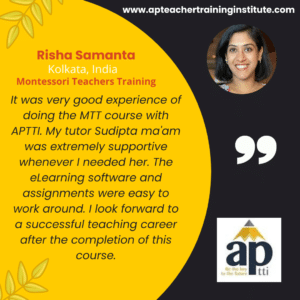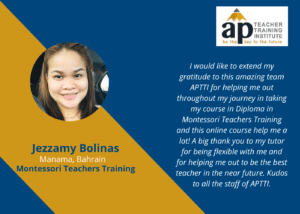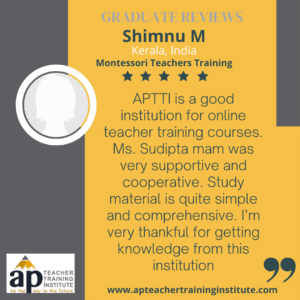Montessori Methods In Montessori Teacher Training
Introduction: Embracing Innovative Pedagogy
Over the ages, education has changed significantly, becoming the foundation of modern society. Although conventional teaching approaches have long been prevalent, the Montessori style of instruction presents a novel and innovative approach. Given the growing emphasis on personalized education and holistic growth, it is critical to comprehend how Montessori education differs from traditional techniques. Let’s explore the differences and the reasons that educators—especially those enrolled in a Montessori Teacher Training Course — need to understand these subtleties.
Evolution of Education: Traditional vs. Montessori
A teacher-led curriculum, a set learning speed, and an organized curriculum are common features of traditional education. On the other hand, mixed-age classes, hands-on learning, and self-directed activity are all stressed in Montessori education. Montessori encourages internal motivation, creativity, and critical thinking, whereas traditional techniques concentrate on rote memorization and standardized testing. This method encourages a child’s innate curiosity and gives them the freedom to investigate topics in-depth and at their own pace.
The Role of the Montessori Teacher: Guide vs. Instructor
The idea that a teacher should act more as a facilitator than a speaker is fundamental to the Montessori school of thought. Traditional teachers usually take charge of the classroom, teaching and regulating behavior. On the other hand, children’s learning experiences are monitored, facilitated, and supported by Montessori teachers. They establish a setting full of engaging items that promote independence and problem-solving skills. They cultivate a sense of ownership over learning journeys by customizing interventions to meet the needs of each individual through astute observation.
Classroom Dynamics: Collaboration and Independence
Desks are frequently placed in rows in a typical classroom, which supports a teacher-cantered learning environment. On the other hand, open areas characterize Montessori classrooms, allowing kids to wander about freely and participate in group activities. Mixed-age groups promote empathy and community by allowing peer mentoring and learning. Additionally, by involving children in real-world activities, Montessori environments foster independence and provide them with the tools they need to take care of their education and acquire critical life skills.
Assessment Paradigm: Beyond Grades and Exams
Standardized assessments and grades play a major role in traditional education’s evaluation of students’ development. On the other hand, the assessment methods used by Montessori are diverse and center upon qualitative observations, portfolios, and student-led conferences. By taking into account a child’s social, emotional, and cognitive development, this holistic approach offers a more thorough picture of their growth. The Montessori assessment encourages a growth mentality and highlights personal strengths by placing more value on the process than the results.
Why Montessori Teacher Training Matters: Shaping Future Educators
The Montessori educational philosophy provides a roadmap for developing lifelong learners and compassionate global citizens in the context of today’s schools, where diversity, equity, and inclusion are critical. Aspiring educators can acquire the pedagogical skills and mentality required to succeed in a variety of learning situations by enrolling in a Montessori Teacher Training Course Online or at an established Online teacher training institute. Knowing the subtleties of Montessori education enables educators to innovate and adapt to the changing requirements of students in the twenty-first century.
Conclusion: Embracing Pedagogical Diversity in Montessori Teacher Training
To sum up, the Montessori approach to teaching is a paradigm change in education since it strongly emphasizes individual learning, teamwork, and holistic development. The Montessori principles strongly emphasize community building, freedom, and intrinsic drive, which contrasts sharply with traditional methods. Understanding these differences through specialized Montessori Teacher Training Courses online or offline is crucial for educators. Educators may better meet the many needs of today’s students by embracing pedagogical variety and raising a generation of inquisitive, resilient, and compassionate people who can navigate a world that is changing all the time.





